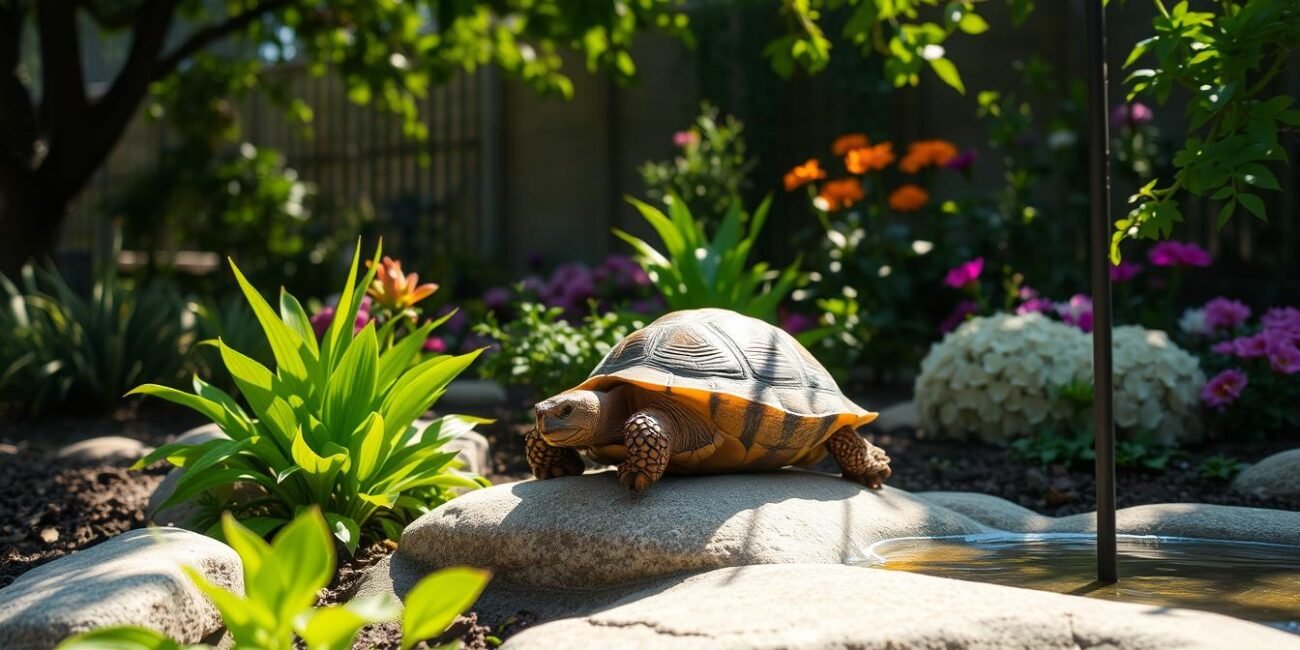As a tortoise owner, knowing your pet’s needs is key. Tortoises can live over 50 years, so caring for them is a big commitment. You need to understand their diet and habitat needs to keep them happy and healthy.
Proper care is crucial for your tortoise’s well-being. This means creating a good habitat with the right temperature and humidity. Also, make sure they have access to fresh water and a diet rich in fiber and calcium. By following these tips, you can give your tortoise a long and joyful life.
Key Takeaways
- Research the specific needs of your tortoise species to provide the best possible care.
- Create a suitable tortoise habitat with the right temperature range, humidity levels, and access to fresh water.
- Provide a balanced diet rich in fiber and calcium to ensure your tortoise’s health.
- Understand the importance of proper care and handling to prevent life-threatening infections.
- Make a long-term commitment to caring for your tortoise, as they can live over 50 years.
- Follow proper tortoise care tips to ensure your pet lives a happy and healthy life.
- Regular veterinary health checks are necessary to detect potential parasites and health issues.
Understanding Different Tortoise Species
There are over 50 species of tortoises, but only a few are popular pets. Each species has its own needs and care requirements. For example, Russian and African tortoises need different habitats and diets. Knowing these differences is key to caring for your tortoise.
When it comes to tortoise care tips, habitat is crucial. A tortoise habitat should match the natural environment of the species. This means providing the right temperature, humidity, and lighting. Tropical tortoises love humid places, while Russian tortoises prefer it drier.
- Russian tortoises: require a dry climate, with humidity levels between 30-50%
- African tortoises: need a warmer and more humid environment, with temperatures ranging from 75-90°F
- Red-Footed tortoises: thrive in warm and humid climates, with temperatures between 75-85°F
| Tortoise Species | Habitat Requirements | Dietary Needs |
|---|---|---|
| Russian Tortoise | Dry climate, 30-50% humidity | High-fiber, low-protein diet |
| African Tortoise | Warm and humid environment, 75-90°F | High-fiber, low-protein diet with calcium supplements |
| Red-Footed Tortoise | Warm and humid climate, 75-85°F | High-fiber, low-protein diet with fruit and vegetables |
Creating the Perfect Tortoise Habitat
Creating a good tortoise habitat involves several important steps. A tortoise enclosure needs a temperature range. It should be cooler at 18-20°C (64-68°F) and warmer at 30-32°C (86-89°F). This range is key for your tortoise’s health.
Choosing the right substrate is also crucial. It should keep moisture and be comfy for your tortoise. A mix of 50% topsoil and 50% play sand is best for Mediterranean species. Your tortoise habitat should also have a shallow water dish and hiding spots for security.
When setting up a tortoise enclosure, consider its size and lighting. Hatchlings need a space of 91 cm x 61 cm (3 ft x 2 ft) with solid sides over 20 cm (8 in) high. Cleaning often is also vital to keep the environment healthy.
By creating a proper tortoise habitat that meets tortoise temperature requirements, you ensure your tortoise’s health. Always research your tortoise’s needs and consult a vet if you have questions.
Essential Equipment for Tortoise Care
Creating a good home for your tortoise is key. You need the right tortoise care tips to keep them happy. A big, well-ventilated space is important. It should be at least 6 times as big as your tortoise.
For a 6-inch tortoise, a 3×3 feet area is a good start. This size ensures they have enough room to move around.
Keeping the right temperature is also crucial. The warmest spot should be around 95 degrees Fahrenheit. But, the floor should stay cooler, not over 85 degrees Fahrenheit.
Tortoises need lots of light too. They should get 10-14 hours of light each day. Make sure to use UVB-producing bulbs. These should be changed every 6-12 months.
- Heat sources, such as heat lamps or ceramic heat emitters
- UVB-producing light bulbs
- A hygrometer to monitor humidity levels
- A thermometer to monitor temperature levels
With the right gear and tortoise care tips, you can make a great home for your tortoise.
How to Care for Your Tortoise: Daily Maintenance Guide
To keep your tortoise healthy, you need a daily routine. This includes a balanced diet, regular enclosure cleaning, and watching for illness signs. How to care for your tortoise is a big commitment, with a lifespan of 30 to 100 years.
Important tortoise care tips include changing water daily and feeding a diet rich in fiber and low in fat and protein. Clean food and water bowls often. Use the right substrate, like coconut coir or sphagnum moss, and keep temperatures right.
Checking your tortoise’s health regularly is key. Look for a bright, alert tortoise with shiny eyes and a high body position. Watch out for diarrhea and breathing problems. By following these tips, you can keep your tortoise happy and healthy.
- Daily cleaning of the enclosure and accessories
- Regular monitoring of temperature and humidity levels
- Providing a source of UV light for calcium absorption
- Ensuring access to a varied and nutritious diet
By sticking to these tortoise care tips and a daily routine, you can keep your tortoise healthy. Always research and talk to a vet if you’re worried about your tortoise’s health.
Proper Nutrition and Feeding Guidelines
Keeping your tortoise healthy starts with a balanced diet. A good diet includes grasses, weeds, and dark leafy greens. It’s important to follow feeding guidelines to ensure your tortoise gets all the nutrients it needs. A diet lacking essential nutrients can cause health problems.
Here are some key feeding tips for your tortoise:
- Offer a variety of foods for a balanced diet
- Stay away from foods high in oxalic acid, like some lettuces
- Limit fruit because it’s high in sugar
- Make sure your tortoise always has fresh water to drink
By following these tips and providing a balanced diet, you can keep your tortoise healthy. Always research the specific dietary needs of your tortoise species. With the right nutrition and care, your tortoise can live a long, happy life.
Temperature and Lighting Requirements
Keeping the right temperature and lighting is key for your tortoise’s health. The temperature needs vary by species, but most need a warm spot and a cooler area. This helps them keep their body temperature right, which is vital for their health.
Lighting is also crucial for tortoises. They need UVB light to make vitamin D3, which helps with calcium and bone growth. You can use special lights like fluorescent or LED for UVB. It’s also important to have a day-night cycle to mimic natural light.
Here are some key considerations for tortoise temperature and lighting requirements:
- Provide a temperature gradient with a basking spot of around 30°C (86°F) and a cooler area of around 20°C (68°F)
- Use UVB lighting to provide a photoperiod and simulate natural daylight
- Replace UVB lights regularly to ensure they remain effective
- Monitor temperature and lighting levels regularly to ensure they are within the recommended range
A good tortoise habitat should have a temperature gradient, UVB lighting, and a day-night cycle. By doing this, you can create a healthy space for your tortoise. Always check the specific needs of your tortoise species, as they can vary.
By following these guidelines, you can help your tortoise live a long, healthy life. Keeping an eye on the habitat and making sure it’s right is crucial for your pet’s health.
| Tortoise Species | Temperature Requirements | Lighting Requirements |
|---|---|---|
| Russian Tortoise | 20-30°C (68-86°F) | UVB lighting, 10-12 hours/day |
| African Sulcata Tortoise | 25-35°C (77-95°F) | UVB lighting, 10-12 hours/day |
| Red-Footed Tortoise | 20-30°C (68-86°F) | UVB lighting, 10-12 hours/day |
Health Monitoring and Common Issues
It’s important to keep an eye on your tortoise’s health. Regular checks can spot problems early. This way, you can treat them quickly and avoid bigger issues. A healthy tortoise looks bright and clear, showing they’re well-hydrated. But dull or cloudy eyes might mean they’re not feeling well.
Some common problems include stomatitis, or mouth rot. This can make your tortoise lose their appetite and show signs like swelling or color changes in the mouth. Respiratory infections are also common, showing as nasal discharge, bubbling from the nose, and raspy breathing. Metabolic bone disease is another big worry, caused by not enough calcium and UVB light.
Knowing the signs of illness is key. Look out for loss of appetite, diarrhea, constipation, and being very tired. If you see these signs, get help from a reptile vet right away. Keeping a clean tortoise habitat and following good tortoise care tips can prevent many health issues. This way, your pet can live a long, healthy life, and checking their tortoise health will be easier.
- Respiratory problems
- Vomiting or weight loss
- Drooping head or limbs
- Gaping mouth
- Not eating after hibernation
- Lethargy and weakness
- Lumps or swelling
- Runny eyes or nose
Knowing these signs and acting fast can help your tortoise get the care they need to stay healthy.
| Health Issue | Symptoms | Treatment |
|---|---|---|
| Stomatitis | Loss of appetite, swelling or color change in the mouth and gums, white, cheesy discharge | Antibiotic treatment, improved hygiene and diet |
| Respiratory Infections | Nasal discharge, bubbling from the nose, raspy breathing | Antibiotic treatment, improved habitat conditions |
| Metabolic Bone Disease | Pyramiding, softening of the shell, lethargy | Improved diet, increased UVB light exposure, calcium supplements |
Seasonal Care Adjustments
As the seasons change, it’s key to adjust your tortoise care. In spring, aim for a basking spot at 95°F (35°C) and a cooler area at 75-80°F (24-27°C). This range is vital for a good tortoise habitat.
In summer, make sure 30-40% of the enclosure is shaded to avoid heat. Desert species need 40-50% humidity, while tropical ones need 60-80%. Always watch the temperature to keep your tortoise safe from heat.
As autumn comes, cut outdoor time by 30 minutes each week for non-hibernating species. For hibernating ones, start reducing food 2-3 weeks before. Hibernation should be between 41-50°F (5-10°C), depending on the species. These steps help keep your tortoise comfortable and healthy.
Don’t forget to change UVB bulbs every 6-12 months for vitamin D3. A 6ft folding tortoise run is great for outdoor time and sunlight. By following these tips, you can ensure your tortoise lives a long, healthy life.
Exercise and Enrichment Activities
Exercise and enrichment activities are key for tortoises’ health. A lively environment keeps them from getting bored. This boredom can cause bad behavior and health issues. Adding live plants, natural wood, and rocks makes their home interesting.
These items encourage them to move around and think. They also feel like they’re exploring.
Items like cuttlebones are great for tortoises. They give calcium and make them forage. A varied diet, with foods like cactus pads and dandelions, keeps them mentally sharp.
When setting up their home, think about what they need. This includes the right ground, temperature, and humidity. This ensures they stay healthy.
More ways to enrich their lives include ramps and bridges. These help them exercise. Introducing friends they can play with is also good.
But, make sure these friends are healthy and get along. Taking them for walks outside is also good. It’s great for indoor tortoises and keeps them healthy.
Some important things to remember for a great environment include:
- Give them a varied and healthy diet
- Make their home interesting with plants, wood, and rocks
- Use ramps and bridges for exercise
- Introduce friends they can play with
- Keep the temperature, humidity, and ground right for their health
By following these tips, you can make your tortoise happy and healthy. Keep their environment lively and watch for changes. This way, your tortoise will live a long, happy life.
Breeding and Reproduction Basics
Understanding tortoise breeding basics is key. Tortoises need a good habitat and the right temperature for breeding. Knowing your tortoise species’ needs is crucial for a healthy breeding process.
For successful breeding, consider these tortoise care tips. You’ll need a big enclosure, the right temperature, and good food. A 12 ft² enclosure is a good start, with bigger species needing more space. Daytime temperatures should be over 75°F (24°C), with basking spots at 85°F to 90°F (30°C to 33°C).
Also, think about your tortoises’ diet during breeding. They need a balanced mix of fruits, veggies, and calcium. Tortoise breeding can be rewarding but needs careful planning and attention.
By following these tortoise care tips and learning about tortoise reproduction, you can breed successfully. Always put your tortoises’ health first. If unsure, get professional advice.
Long-term Care and Lifespan Considerations
Understanding a tortoise’s tortoise lifespan is key in tortoise care. Some species can live over 100 years. This means caring for them is a long-term commitment.
Creating the right tortoise habitat and following tortoise care tips greatly affects their life quality and how long they live.
A good tortoise habitat needs a big enough enclosure, the right substrate, and a temperature range. The enclosure should be at least 10 square feet for each adult tortoise. Larger species need even more space.
The temperature should have a basking area of 90-100°F and a cooler area of 70-80°F.
It’s also important to follow tortoise care tips closely. This includes a balanced diet, regular vet visits, and keeping the environment clean. Knowing the tortoise lifespan and following these tips can help your tortoise live a long, healthy life.
Conclusion: Ensuring a Happy and Healthy Life for Your Tortoise
Starting your journey to care for your tortoise is exciting. With the right habitat, diet, and health checks, your pet can live a long, happy life. Tortoises can live over 100 years. Keeping the temperature between 75-85°F and humidity at 30-50% is crucial for their well-being.
Feeding your tortoise the right foods is important. Give them leafy greens, veggies, and fruits sometimes. But, avoid foods like iceberg lettuce and avocado. Instead, choose healthy options like kale, squash, and grass hay. Regular vet visits and care help prevent health problems.
This guide has given you the tools to care for your tortoise. You’ll know how to keep them healthy and happy for years. Enjoy their unique personality and the bond you’ll form. Your hard work will make caring for your tortoise a rewarding experience.
FAQ
What are the key considerations for caring for a tortoise?
Key things for tortoise care include a good home, balanced food, right temperature and light, health checks, and fun activities. These help your tortoise stay happy and healthy.
How do I set up the perfect habitat for my tortoise?
To make a great home for your tortoise, think about temperature, humidity, and substrate. Choose a substrate that holds moisture well. Also, make sure there’s proper UVB lighting and places for hiding.
What should I feed my tortoise, and how often should I feed them?
Tortoises need a diet full of fiber and calcium. Give them dark leafy greens, veggies, and fruits sometimes. Add supplements and feed them regularly, based on their species and age.
How can I monitor my tortoise’s health and recognize signs of illness?
Watch your tortoise for signs of sickness like changes in eating, being tired, or odd discharge. Take steps to prevent illness and get vet help if you see any bad signs.
How do I adjust my tortoise’s care for the different seasons?
Adjust care for your tortoise with the seasons by changing temperature, humidity, light, and outdoor time. Make sure their home meets their needs in every season to keep them healthy.
What kind of exercise and enrichment activities do tortoises need?
Tortoises need safe outdoor time, new things to explore, and friends. Give them chances to search, hide, and move around to keep them active and fun.
How long do tortoises live, and what are the considerations for their long-term care?
Tortoises can live a long time, up to 50-100 years or more. Plan for their long life by giving them the right care as they age. Also, think about their future by making plans for their care after you’re gone.
Source Links
- Want To Keep And Care For A Tortoise? Read These Tips – Reptiles Magazine – https://reptilesmagazine.com/want-to-keep-and-care-and-care-for-a-tortoise-read-these-tips/?srsltid=AfmBOoqrZbsRRz7NGTdtbsPcd7WJkKKZY8F2XdxSncqi94AEjpVXFjix
- Comprehensive Guide to Caring for Tortoises — Pandemonium Rainforest Project – https://www.pandemoniumrainforestproject.org/blog-1/comprehensive-guide-to-caring-for-tortoises
- A Beginner’s Guide to Owning a Tortoise | Green Lane Farm Boarding Kennels – https://www.greenlanefarmboardingkennels.co.uk/news/a-beginners-guide-to-owning-a-tortoise/
- PDF – https://petadvocacy.org/wp-content/uploads/2022/01/Tortoise-Care-Sheet.pdf
- Tortoise Basics for Prospective or Beginner Tortoise Owners – https://www.tortoiseforum.org/threads/tortoise-basics-for-prospective-or-beginner-tortoise-owners.22635/
- Choosing a tortoise species | Which tortoise species should I buy? – https://www.tortoisesupply.com/TortoiseSelectionGuide
- Tortoise Habitat – https://www.instructables.com/Tortoise-Habitat/
- Indoor Housing – https://www.thetortoisetable.org.uk/tortoise-care/enclosures/indoor-housing/
- Tortoise Care Sheet – https://allpetsvetnh.com/wp-content/uploads/2022/03/Tortoise-Care-Sheet.pdf
- What set up do I need for my Tortoise? – ExoticDirect – https://exoticdirect.co.uk/news/tortoise-care-essentials/
- How to Care for a Tortoise (with Pictures) – wikiHow – https://www.wikihow.com/Care-for-a-Tortoise
- Tortoise Care Guide For Beginners – https://www.hugglepets.co.uk/tortoise-care-guide-for-beginners/
- Cleaning & Maintenance – https://www.thetortoisetable.org.uk/tortoise-care/enclosures/cleaning—maintenance/
- Desert Tortoise Care – https://healthtopics.vetmed.ucdavis.edu/health-topics/exotics/desert-tortoise-care
- Tortoise Diet – https://www.thetortoisetable.org.uk/tortoise-diet/
- What Do Tortoises Eat? Understand Their Natural Diet and The Right Foo – https://homeandroost.co.uk/blogs/tortoise/what-do-tortoises-eat?srsltid=AfmBOorCBS2rDpAB-dMGBdRUIz83gIOvP-4C0miI6Hy2yqHuPGv4dYxX
- Tortoise Care Guide | Long Island Avian and Exotic Vet Clinic – https://www.birdexoticsvet.com/tortoise-care-guide
- Routine Care – https://www.thetortoisetable.org.uk/tortoise-care/routine-care/
- How To Care For Your Pet Tortoise – https://www.608vets.com/pet-help-advice/exotic-pets/43-care-for-your-pet-tortoise
- Tortoise health problems: what to do with a sick tortoise – https://www.myfamilyvets.co.uk/tortoise-health-problems
- Tortoise Health Check | Essential Routine to Keep Your Tortoise Health – https://homeandroost.co.uk/blogs/tortoise/tortoise-health-check?srsltid=AfmBOoq79g8dTb7d640PyQL30NubiebSwbFv-XCW8V_iLFDFe908Q98o
- Basic tips for top tortoise care – https://www.veterinary-practice.com/article/tortoise-care-tips
- Seasonal Care Tips for Tortoise Habitats: Adapting Your Setup Year-Rou – https://homeandroost.co.uk/blogs/tortoise/seasonal-care-tips-for-tortoise-habitats-adapting-your-setup-year-round?srsltid=AfmBOopnRN-bFAQGYB1MXgyumB69DNf6vuDouPGeXhpkjMMRWXhs8AY2
- The Best Way To Raise Any Temperate Species Of Tortoise – https://www.tortoiseforum.org/threads/the-best-way-to-raise-any-temperate-species-of-tortoise.183131/
- 9 Tortoise Toys and Enrichment Activities for Your Pet – https://tortoiseresourcecenter.com/tortoise-toys/
- 7 Pet Tortoise Enrichment Ideas | PetMojo – https://www.petmojo.com/pet-tortoise-enrichment-ideas/
- General Tortoise Husbandry – http://www.exoticpetvet.com/general-tortoise-husbandry.html
- Hermann’s Tortoise Care Guide | hermannihavenhome – https://www.hermannihaven.com/t-hermanni-care-sheet
- Tropical Tortoise Care Sheet – https://www.petmd.com/reptile/tropical-tortoise-care-sheet
- Tortoise Lifespan Facts and Figures: Care Tips for Longevity – https://tortoiseresourcecenter.com/how-long-does-a-tortoise-live/
- Caring for Your Tortoise: Tips & Essentials – https://reptilesupershow.com/caring-for-your-tortoise-tips-essentials/
- Desert Tortoises and Turtle Advice and Care – American Tortoise Rescue – http://www.tortoise.com/turtle-advice-and-care.html
- Tortoise: Care and Husbandry | Warren Woods Veterinary Hospital – https://www.wwvhcares.com/tortoise-care-and-husbandry










No Comment! Be the first one.